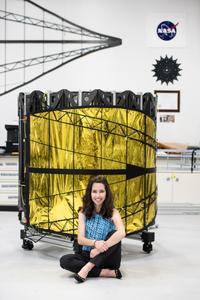Splash Biography
SOPHIA SÁNCHEZ-MAES, Physics & Astrophysics 2019
|
Major: Physics & Astrophysics College/Employer: Yale Year of Graduation: 2019 |

|
Brief Biographical Sketch:
I'm a senior from the New Mexico borderlands majoring in physics and in astrophysics at Yale. I love learning about the world around me! My current research interests are in high energy physics, investigating the quark-gluon plasma which permeated the early universe. I've previously done work in photonics, next-gen biofuels, and in one particularly exciting summer, got to write code for MSL (the Mars Rover) and Mars 2020 while at NASA JPL. I love good friends, red chile, and the universe. Past Classes(Clicking a class title will bring you to the course's section of the corresponding course catalog)E3542: Keys to entropies in Sprout Spring 19 (Feb. 16 - Mar. 02, 2019)
What is entropy? Is it disorder? Information? Randomness? Heat? The answer depends on who you ask. But it also depends on what you're asking about! If you’ve ever wondered why your eggs never unscramble, or why you’ve never found yourself breathless as all the air never spontaneously moves to one side of the room, this is a great class for you! The laws of physics can run backwards and forwards, but time only marches one way. In this class, we will gain insight into “irreversibility” by understanding how time disfavors the improbable! Through discussion and demonstrations, we will gain insight into the many applications of the concept of entropy, and clarify the different notions of this idea which arise in different areas of physics and chemistry. The class will work to introduce concepts. Comfort with mathematical ideas (logarithms, summation, and factorials, for example) is useful for deeper understanding, though not necessary.
S2705: Planetary queries: the spectacular science of exoplanets in Splash Spring 17 (Apr. 08, 2017)
Do you ever wonder how life formed on the cosmic scale? How systems of planets like ours form and evolve? We've discovered thousands of other worlds in the pasts two decades, but what do we really know about them - and how? Is there already a course where someone answers and elaborates on these questions? No? Then I guess I'll planet!
E2466: A Hitchhikers Guide to Observing the Universe in Sprout Spring 17 (Feb. 11 - 25, 2017)
Come learn how to explore the universe, from the comfort and safety of your own home! A short, hands-on introduction to methods of exploring the universe (with occasional brief commentary on its contents).
In this class, you'll learn something about astronomical observing across wavelengths, stare at the sun, and then use a telescope!
S2371: Let it Flow: Fun with fluids in Splash Fall 16 (Nov. 05, 2016)
Ever wonder why airplanes fly? How vortices work? How to simulate galactic dynamics? We're going to explore fluid mechanics, the simple physics that explains everything from the behavior of stars to oceans, plate tectonics to blood flow.
S2372: History of the Universe : Big Bang - Present in Splash Fall 16 (Nov. 05, 2016)
What better place to start than the beginning? Of time, that is. This course will piece together the eras of cosmic history, taking special note of the advances in astronomy, elementary particle physics, and nuclear physics that built our current knowledge of the exciting first billion years of cosmic existence.
S1946: History of the Universe : Big Bang - Present in Splash Spring 16 (Apr. 02, 2016)
What better place to start than the beginning? Of time, that is. This course will piece together the eras of cosmic history, taking special note of the advances in astronomy, elementary particle physics, and nuclear physics that built our current knowledge of the exciting first billion years of cosmic existence.
S1947: 100 Years of Mars in Splash Spring 16 (Apr. 02, 2016)
Got Curiosity? Then you already have a lot in common with the Red Planet! 50 years in, investigate and extrapolate the first century of our interaction with Mars. From Mariner to the Martian, we'll explore the legacy of robotic pioneers and examine NASA proposals for eventual human missions to Mars.
|
|
